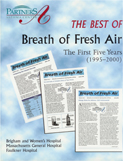Breath of Fresh Air: Feature Articles
Chapter 53: "You Need to Get a Degree in Asthma"
Ora D.’s asthma began quite suddenly in her early 20s, when she was in her second year of college. She had never had asthma or allergies as a child. "Every time I would get a cough or a cold, I would wheeze a litte, and — you know — I wouldn't pay any attention to it." Soon thereafter she moved for her work to Atlanta, and her symptoms went away for approximately 10 years.
While in Atlanta she suffered a sudden and overwhelming asthmatic attack. She collapsed and was rushed to the hospital, having stopped breathing. She was treated there in the intensive care unit on a breathing machine (mechanical ventilator). There for the first time the diagnosis of her asthma was made!
The following year she returned to Boston, and since then she has received her care from a physician who is now part of the Partners Asthma Center. She says that over the years she has learned a lot about her asthma and especially about how to prevent dangerous asthmatic attacks. For one thing, she knows what things are likely to set off her asthma. "Dust in the wind, pollen, a really bad cold, and strange odors like ammonia" are among the things that she identifies as her triggers. "You have to be really careful because you have to avoid certain areas and certain stores even. You learn, by elimination; you may get sick, but you learn where not to go and what not to do."
For another thing, she has identified her particular early warning signs of the beginning of an attack. She experiences an itch, "almost like sand," in her chest, and then she hears a soft "baby wheeze" with her breathing. She has a nebulizer at home (an electric machine to deliver her bronchodilator medicine as a continuous mist to breathe) and uses it if her wheezing becomes audible. "By the time you start wheezing, your asthma attack has already started. If I take three treatments, and it doesn't go away, hospital here I come. You don't take chances."
The worst thing about having asthma? "At first I thought it was trying to remember to take all the medicines. When you first start, that can be a bit trying. But the worst thing I think is trying to breathe. It's a feeling that's indescribable when you're in the folds of having an attack because you can't get air in and you can't get air out and you're fighting [for air]. In your mind you're thinking you're going to die. I think the fear of dying is the worst."
Sometimes it has been hard for Ora to share her experiences with family or friends. "Even if you talk about it with someone, they can't grasp the depth of asthma. Most people are preconditioned: 'Oh, asthma is all in your head; oh, you can do this and you can do that.' They don't realize that this is your lung involved, this is your heart, everything you've got is involved in asthma trying to breathe. People don't understand unless they have it or they're directly affected by it."
Ora describes her experience with asthma as a process of learning. "Since the time I've had it, I've learned more about asthma. I've learned more signs [of asthma]. I've learned where not to go, where not to be. I've learned my medicine: what it can do, what it can't do. I think it's all a process of learning. You've got to know. When I didn't know as much as I know now about it, that's when I was scared the most. If you don't know, you don't know what to do. Asthma is like preparing to go out into the world. It's like going to school. You need to get a degree in asthma."
Ora is impassioned when asked to offer advice to others with asthma. "You can live with asthma. You can do a lot of things. But you have to deal with asthma straight up. You can't fool yourself. You can't play with it. You can't forget to take your medicines with you. It's your life. This is what is keeping you breathing. You have to maintain. Even if you are not going to have an attack, you don't know that. Why take the chance? Keep the medicine with you. Please."

